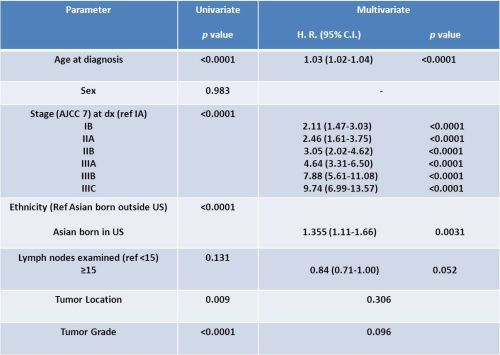|
Back to 2015 Annual Meeting Program
Survival Outcomes Are Impacted by Birthplace Rather Than Extent of Surgery in Asian-Americans With Resectable Gastric Cancer
Daniel D. Kirchoff*1, Gary B. Deutsch1, Manabu Fujita1, Myung Shin SIM2, Ji Hey Lee3, Anton Bilchik1
1Surgical Oncology, John Wayne Cancer Institute, Santa Monica, CA; 2Biostatistics, University of California - Los Angeles, Los Angeles, CA; 3Biostatistics, John Wayne Cancer Institute, Santa Monica, CA
Background: Outcomes from gastric resections for cancer in the US still significantly lag behind those in Asia and other Western countries. Furthermore, Asian patients in the US have better outcomes than non-Asians, but not approaching outcomes from Asian countries. Genetic, environmental, and tumor biological differences, along with extent of surgery have been implicated.
Objective: Our objective was to evaluate survival outcomes in Asian-American gastric cancer patients undergoing surgical resection by comparing place of birth and clinicopathologic characteristics (including evaluation of 15 lymph nodes [LN]).
Methods: The Surveillance, Epidemiology, and End Results (SEER) database was queried to identify patients treated surgically for gastric cancer with curative intent in the US (2000-2010). Asian-American patients, dichotomized by US or non-US birthplace, were analyzed, and compared to the entire population including all ethnicities. Stage IV and non-surgical patients were excluded.
Results: 10,089 patients were identified who met criteria. 1,467 patients were Asian, 271 born in the US and 1,196 born outside the US. Median survival was 32 months for non-Asians, 29 months for US-born Asians, versus 61 months for Asian immigrants (p<0.0001). There was no difference in LNs evaluated between the two Asian groups. While LN evaluated, tumor location, and tumor grade predicted survival in the population inclusive of all ethnicities, those factors were not significant in the Asian-American population. On multivariable analysis of overall survival, only US birthplace, older age, and higher stage yielded a significantly poorer outcome.
Conclusion: Asian-American patients undergoing surgery in the US for gastric cancer have a worse prognosis if born in the US. Anatomic and surgical differences do not explain this disparity; environmental factors may be responsible.

Multivariable analysis of overall survival for Asian patients undergoing gastrectomy
Back to 2015 Annual Meeting Program
|


